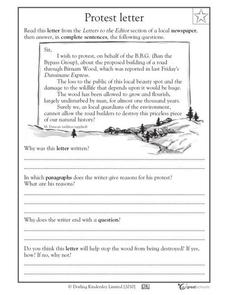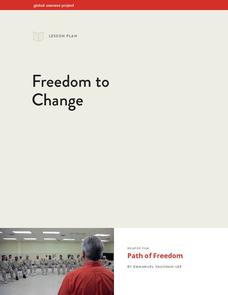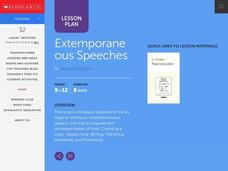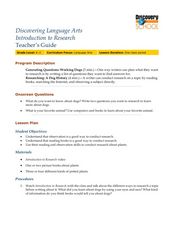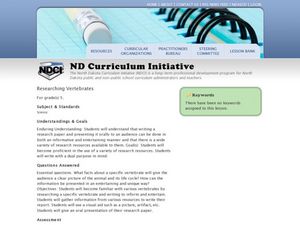Cornell University
Fibers, Dyes, and the Environment
Nanofibers can be made through electrospinning or force spinning in order to reduce the negative impact on the environment. Pupils study the role of fibers and dye on the environment through a series of five hands-on activities. Then,...
Curated OER
"The Island of Plenty": Reading Guide
Johnson C. Montgomery’s controversial plea for American social isolationism, “The Island of Plenty,” launches an in-depth study of the structure and logic of the essay. After responding to a series of questions, individuals craft a...
Annenberg Foundation
Rhythms in Poetry
Rhyme, rhythm, free verse, imagery: Do these words describe poetry, or jazz music? The answer is both! A resource explores these similarities as scholars watch a video, engage in discussion, read author biographies, write poetry and...
Academy of American Poets
Women in Poetry
Imagine linking poetry to technology! Thirty-three lessons comprise a 6-week "Women in Poetry" unit for high schoolers. Class members research women poets, learn how to respond electronically to discussions, write their poems, create web...
C3 Teachers
Women’s Rights: What Does It Mean to Be Equal?
A guided-inquiry lesson asks seventh graders to research the compelling question, "What does it mean to be equal?" Guided by three supporting questions, researchers complete three formative performance tasks and gather evidence from...
National Endowment for the Humanities
James Madison: Madison Was There
Madison was there! Scholars go on a journey to discover the person behind the founding father label as they explore James Madison's role in the formation of the United States government. The culmination is a writing assignment and...
Environmental Protection Agency (EPA)
How Much Water Do You Use?
Incorporate reading strategies, math, research, and the scientific method into one lesson about water conservation. After reading a story about a landlady trying to determine how many people are living in an apartment, learners develop a...
Curated OER
Playing With Science
Young scientists investigate the scientific concepts and principles that help make common toys such as hula hoops, yo-yos, slinkies, and silly putty work. As a class, they read "Backyard Rocket Science, Served Wet" to get a look behind...
Penguin Books
A Teacher's Guide to the Signet Classics Edition of Mark Twain's The Adventures of Huckleberry Finn
Whether new to teaching The Adventures of Huckleberry Finn or an experienced pro, you’ll find useful resources in this teacher’s guide. The 40-page packet includes background information, historical context, an annotated list of...
Community Resources for Science
A Whole New World of DNA and Proteins
Lead your young scientists into an exciting world as they participate in a role play and experiment focused on proteins and DNA. After researching the Central Dogma of Biology, individuals or groups participate in a classroom slide...
NASA
Producers Make Their Own Food
During an inquiry-based lesson, scholars decide which variable to test and then design an experiment to determine the needs of producers. After two weeks, they complete a full analysis and research paper.
Street Law
The Challenge of Selecting an Ideal Supreme Court Nominee
Nearly every president has had the opportunity to name a nominee to the United States Supreme Court. But what makes someone an ideal candidate to become a Supreme Court justice? High schoolers test their prior knowledge about the Supreme...
Annenberg Foundation
Poetry of Liberation
How do writers use words to protest injustice, challenge the status quo, and shape their own identities? Individuals watch and discuss a video, read author biographies, write poetry and journals, develop a slideshow, and complete a...
National Endowment for the Humanities
Cultural Change
High schoolers research the passage of the 19th Amendment as an illustration of the mutual influence between political ideas and cultural attitudes. They also read the Seneca Falls Declaration and explore the cultural shifts it both...
Curated OER
Protest Letter
What a fantastic resource to guide youngsters in persuasive letter writing. They read a brief letter to the editor and answer question about the author's purpose, word choice, and structure. Next, scholars draft their own letter by...
Scholastic
Reading Characters
Philip Pullman's The Golden Compass provides the text for a study of how writers bring characters to life. Using the provided character mapping worksheets, readers respond to questions and then write a short character sketch.
Global Oneness Project
Learning with Nature
Think outside the box - and think about education beyond the classroom walls - with a resource that has your critical thinkers watching a video about a nursery in Scotland that lets youngsters roam wild in a forest. Viewers reflect on...
Global Oneness Project
Freedom to Change
Here's something unusual and thoughtful: have your scholars do some pensive reflection themselves before tackling how such meditative techniques are used in prison rehabilitation programs. They watch the "Path of Freedom" video found...
C3 Teachers
2020 Protests: Is There Anything New about the 2020 Protests?
Are marches and protests an effective form of resistance? That is the question high schoolers seek to answer in this inquiry lesson as they compare the 2020 protests to historical ones. Researchers use Venn Diagrams to compare images...
Curated OER
Extemporaneous Speeches
High schoolers perform the six steps of writing an extemporaneous speech including, choosing a topic, researching, writing, practicing delivering and processing.
Curated OER
Working With Writing
Fifth graders research a topic of their choice using the internet, magazines, and books. In this research lesson plan, 5th graders are graded on their research and delivery skills of their presentation.
Curated OER
Discovering Language Arts: Introduction to Research
Students research plants. In this researching lesson, students watch a video about the different ways to research a topic before writing about it. Students use the information gathered in this video to learn more about plants. Students...
Curated OER
Researching Vertebrates
Fifth graders research and present a paper about vertebrates. In this research and writing lesson, 5th graders research information about vertebrates which they include in a paper and presentation. They determine how to present relevant...
Curated OER
Developing Student Web Pages for Showcasing Research
Students employ information literacy skills to research topics. They develop topics using a graphic organizer. They draft, revise and edit research projects. They write an expository essay. They create a web page in Microsoft Publisher.
Other popular searches
- Writing a Research Paper
- Holocaust Research Papers
- Rubric for Research Papers
- Hiv Aids Research Papers
- Outlines for Research Papers
- Writing Research Papers
- Research Papers High School
- Author Research Papers
- How Write Research Papers
- Writing and Research Process
- Descriptive Research Writing
- Teaching Research Papers
















